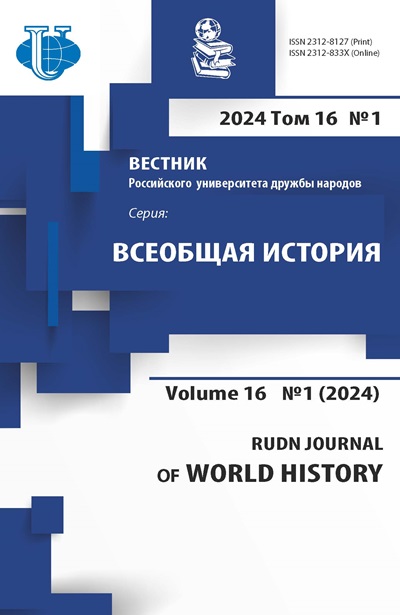No 3 (2013)
- Year: 2013
- Articles: 9
- URL: https://journals.rudn.ru/world-history/issue/view/133
Articles
Editor’s note
RUDN Journal of World History. 2013;(3):5-7
 5-7
5-7


It is always necessary to have leaders. On the question of the mass consciousness of the eastern society
Abstract
The author tries to clarify the features of the mass consciousness in the East, believing that they are fundamentally different from that of the political culture of the West. To solve this problem he sees as common approaches developed in social psychology to the phenomenon of the mass consciousness, and finds the «Eastern» the specificity of the phenomenon. The author defends the concept of equality of civilizations, emphasizes the need to dialogue, not conflict. Opposes the so-called democratic transition and globalization of the world under the auspices of the State monopoly.
RUDN Journal of World History. 2013;(3):8-22
 8-22
8-22


 23-35
23-35


Forming peculiarities of ethnocultural policy of China in the early Middle Ages
Abstract
The problem of ethnic and cultural contacts with the non-Chinese people in China in the early medieval period shows an important feature of Chinese civilization, which consists in the fact that all the elements brought about gradually adapting and become the elements of the Chinese culture.
RUDN Journal of World History. 2013;(3):36-44
 36-44
36-44


Chinese – African educational issues, the first half of 1960s (based on the «African Student in China» diary)
Abstract
The article analyses the notes of the «African Student in China» using it as a source of data on Chinese-African cooperation in the field of education in the first half of the 1960s. The article contains a review of the main issues outlined by the author: the structure of the Chinese higher education system; the living standards of the students (both foreigners and natives); mutual perceptions; personal opinions of the foreigners on the «Great Leap Forward» policy. The article also provides for some statistics on the number of African students in PRC. Based on that data the conclusion is made, describing the readiness of the parties for cooperation in the named field in the beginning of the 60s.
RUDN Journal of World History. 2013;(3):45-56
 45-56
45-56


Emperor Haile Selassie (I) and the Organization of African Unity (Devoted to the 50 th anniversary of the African Union)
Abstract
The article is devoted to the history of the creation of the Organization of African Unity (since July 2001, the African Union), the author devotes particular attention the role of the Emperor of Ethiopia Haile Selassie I in bringing the African countries together and the establishment of overall African organization.
RUDN Journal of World History. 2013;(3):57-71
 57-71
57-71


Events and figures artistic culture of Russia Peter The Great’s era in the documents of the Berg-Collegium of Manufactories
Abstract
For the study of the history of art culture brought poorly studied the source of the protocols Berg and the Collegium of Manufactories. Fully presented the data about painters (masters and students) in 1720, selectively – for other years. Provides information on the activities of working in Russia of the French artist. Material concerns created works of art, places, conditions of and remuneration for the work, work organization and training, interaction between the institutions, speakers customers and curators of the project.
RUDN Journal of World History. 2013;(3):72-83
 72-83
72-83


Prizes in Panathenaic Games
Abstract
Sixth-century Athens combined earlier prize traditions to produce the most artistically significant local prizes, inscribed Panathenaic amphoras filled with olive oil. Panathenaic amphoras were an eclectic and yet innovative development s civic, self-declaratory prizes of material and symbolic value. Originally the prize olive oil came from sacred trees and was thus the gift of Athena. Panathenaic prize was a combination of elements Panhellenic and local games.
RUDN Journal of World History. 2013;(3):84-95
 84-95
84-95


Our authors
RUDN Journal of World History. 2013;(3):96
 96
96
















